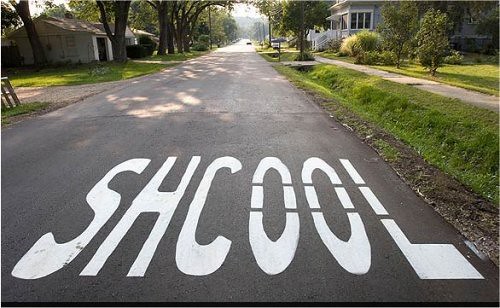
Years ago in a dusty old bookshop in New Orleans, I found a 1950s self-help book with the title Be Glad You're Neurotic. I wasn't sure whether to buy it, so I stood for a while considering, and then I left it, only to come back a week later and get it anyway (because I'm neurotic). It was worth every penny. I've always thought I was a little nuts, but this guy was saying, "Hey, we're all a little crazy. But the really crazy guys do all the brilliant stuff, so be glad if you're a little weirder than those other bozos." It gave me license to accept some of my idiosyncrasies, to use them rather than try to change them.
Modern parents need a similar sort of book, but I'd call it Be Glad Your Kid's a Failure. I know. I know. Nobody wants a loser kid. Everybody wants the kid with straight As and perfect attendance and blah, blah, blah, but the fact is, failure is a good thing. Failure is how we learn. If a kid never fails, that probably means he isn't learning much.
Counter-intuitive? No. Learning means starting from a place of ignorance and gaining knowledge and insight. How do we come across knowledge and insight? Trial and error. If a kid can make it through a class without once screwing up, he should probably be in a harder class. Learning should be hard. Yes. Hard. A challenge. It should strain kids...in a good way. It should stretch them...in an exciting way.
If there's no chance of failure, life is boring. Failure is what gives risk its riskiness. And risk-taking is awesome. If we tell kids that failure is a bad thing, we're implying that risk-taking is a bad thing (unless we know for certain we're not going to fail). If kids grow up afraid to take risks, we're going to have a pretty stale world.
As a teacher, I meet a lot of parents who worry themselves sick every time their kid makes a B. If the kid forgets to turn in homework, we've got to make some sort of concession to fix it. Can't you just give him partial credit?
How about no. Give the kid an opportunity to experience screwing up and then sucking it up so that he doesn't keep doing it (or at least so that he figures out how to deal with it). If we don't let kids fail, if we scoop them up every time they goof and dust them off, they'll never learn how to scoop themselves up. Which is fine if you want them living with you forever (and maybe you do, but I can assure you, as much as I dote on my child, I do not). The brain that solves the problem is the brain that learns. If you solve all of your kid's problems, sweep every error under a rug, who's learning?
Then again, don't make every failure a traumatic experience.
My son is a pretty bright kid. When he was in second grade, all the papers he brought home were As, and I got accustomed to it. And then he brought home a 60. My heart stopped. I looked at him with sad disappointment.
"My boy, my boy! What's happened to you, son? Where have I gone wrong? Didn't I raise you better than this?"
And then it occurred to me: did I make this much of a fuss over his As? Should it really be this big a deal? Can we just take a look at that paper and figure out what we need to do differently next time instead of the weeping and moaning and gnashing of teeth? And that was the last time I did that because I realized, it happens. And it's okay.
One of my favorite quotes ever was from Henry Ford: Failure is the opportunity to begin again more intelligently. It's a terrible injustice to a child to shield him from failure. Failure happens way too often in life, and it'd be a shame for a kid to get all the way through school, out of the protective embrace of mom and dad, only to encounter his first failure unsupported. Failure should happen early and often. It's healthy. It's how we learn.

No comments:
Post a Comment